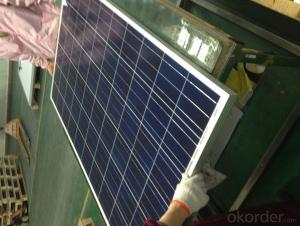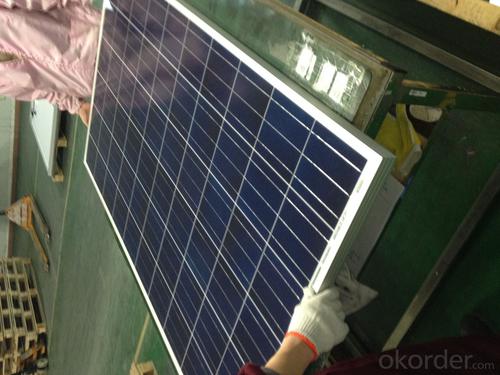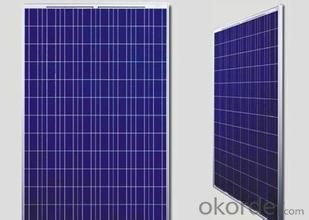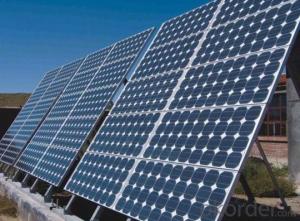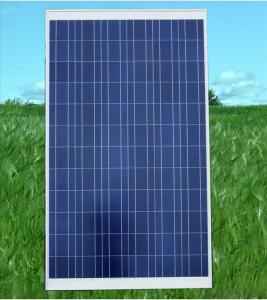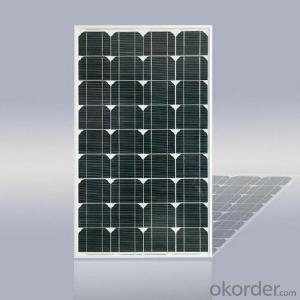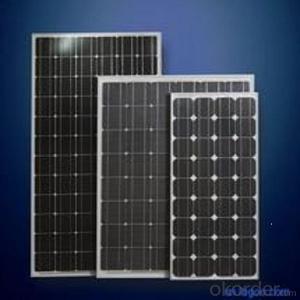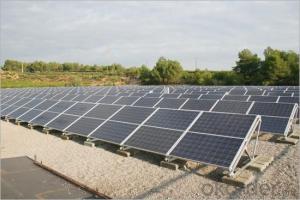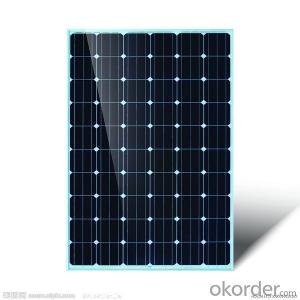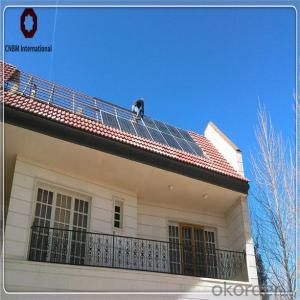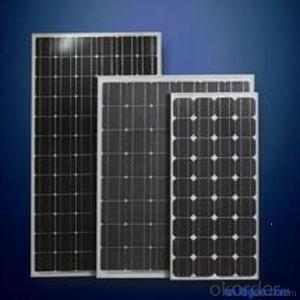Solar Panels Sales - Good Quality & Low Price 260W
- Loading Port:
- Shanghai
- Payment Terms:
- TT OR LC
- Min Order Qty:
- 8000 watt
- Supply Capability:
- 100000000 watt/month
OKorder Service Pledge
OKorder Financial Service
You Might Also Like
Roof-mounted solar power systems consist of solar modules held in place by racks or frames attached to roof-based mounting supports.
Roof-based mounting supports include:
Pole mounts, which are attached directly to the roof structure and may use additional rails for attaching the module racking or frames.
Ballasted footing mounts, such as concrete or steel bases that use weight to secure the panel system in position and do not require through penetration. This mounting method allows for decommissioning or relocation of solar panel systems with no adverse effect on the roof structure.
All wiring connecting adjacent solar modules to the energy harvesting equipment must be installed according to local electrical codes and should be run in a conduit appropriate for the climate conditions
Solar panel conversion efficiency, typically in the 20 percent range, is reduced by dust, grime, pollen, and other particulates that accumulate on the solar panel. "A dirty solar panel can reduce its power capabilities by up to 30 percent in high dust/pollen or desert areas", says Seamus Curran, associate professor of physics at the University of Houston and director of the Institute for NanoEnergy, which specializes in the design, engineering, and assembly of nanostructures.
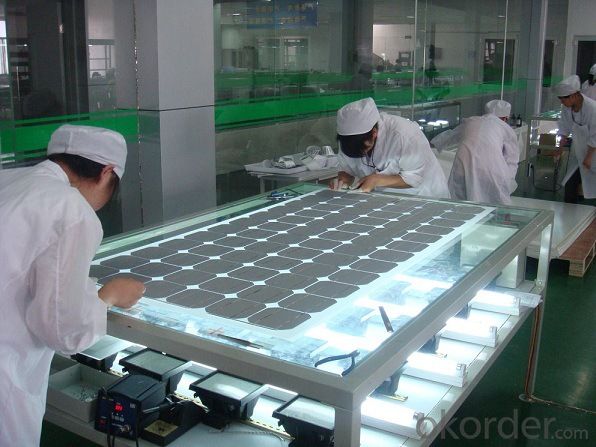
Specifications
solar panels from 5W--300W, made of TAIWAN MOTECH brand cells,with CO in TAIWAN,Mono and Poly with VDE,IEC,CSA,UL,CE,ISO.
We import solar cells from Taiwan Motech brand, with this CO in taiwan and our CSA certification,we can still sell goods to Anti-dumping areas like USA. Our main products are solar panels, off grid and on grid solar home systems , solar street lighting systems, solar water heating system,solar pump,solar attic fan, solar DC LED lights and solar DC refrigerators.
Certificates : ISO, CE, VDE IEC, MCS, CSA-UL, CEC.
Delivery time: sample 10days, order 25-30days.
Sample: charged.
Payment term: T/T 30% as deposit, 70% before shipment. Or irrevocable L/C at sight.
Trade term: FOB Shenzhen or CIF destination seaport or Airport.
Characteristics:
I.Solar Cell : High efficiency crystalline solar cell. Even if under the weak light, the solar module can produce maximum power output.
II.Tempered glass (toughened glass): Anti-reflecting coating and high transmission rate glass increase the power output and mechanical strength of solar module.
III.EVA and TPT: Using high quality EVA and TPT to prevent destroying and water.
IV.AI frame: Without screw, corner connection. 6 holes on the frame can be installed easily.
V.Junction box: Multi function junction box with water proof.
VI.Long lifetime: ≥25 years; Less power decrease.
VII.Good performance of preventing from atrocious weather such as wind and hails.
VIII.Resisting moisture and etching effectively, not effected by geology.
IX.The certificate issued by international authority: UL, TUV, IEC, VDE, CE.
Quality and Safety
1. Rigorous quality control meets the highest international standards.
2. High-transmissivity low-iron tempered glass, strong aluminium frame.
3. Using UV-resistant silicon.
4. IS09001/14001/CE/TUV/UL
Warranties
1. 10 years limited product warranty
2. 15 years at 90% of the minimal rated power output
3. 25 years at 80% of the minimal rated power output
Technical date :
ITEM NO.: | Poly 156*156 cell ,60pcs . Power range from 230Wp-260Wp | ||||||
Maximum Power(W) | 230 | 235 | 240 | 245 | 250 | 255 | 260 |
Optimum Power Voltage(Vmp) | 29.4 | 29.5 | 29.7 | 30.1 | 30.3 | 30.5 | 30.7 |
Optimum Operatige Current(Imp) | 7.83 | 7.97 | 8.08 | 8.14 | 8.25 | 8.37 | 8.48 |
Open Circuit Voltage(Voc) | 36.7 | 36.8 | 36.9 | 37.1 | 37.3 | 37.5 | 37.7 |
Short Circuit Current(Isc) | 8.52 | 8.59 | 8.62 | 8.65 | 8.69 | 8.73 | 8.78 |
Solar Cell: | 156*156 Poly | ||||||
Number of Cell(pcs) | 6*10 | ||||||
Name of Solar Cells | Polycrystalline Cell | ||||||
Size of Module(mm) | 1650*992*40/45/50 | ||||||
Cable & Connector Type | Pass the TUV Certificate | ||||||
Frame(Material Corners,etc.) | Aluminium-alloy | ||||||
Back sheet | TPT | ||||||
Weight Per Piece(KG) | 19.5KG | ||||||
FF (%) | 70-76% | ||||||
Junction Box Type | Pass the TUV Certificate | ||||||
Tolerance Wattage(e.g.+/-5%) | ±3%, or 0-3% | ||||||
Front Glass Thickness(mm) | 3.2 | ||||||
Temperature Coefficients of Isc(%) | +0.04 | ||||||
Temperature Coefficients of Voc(%) | -0.38 | ||||||
Temperature Coefficients of Pm(%) | -0.47 | ||||||
Temperature Coefficients of Im(%) | +0.04 | ||||||
Temperature Coefficients of Vm(%) | -0.38 | ||||||
Temperature Range | -40°C to +85°C | ||||||
Surface Maximum Load Capacity | 5400Pa | ||||||
Allowable Hail Load | 23m/s ,7.53g | ||||||
Bypass Diode Rating(A) | 12 | ||||||
Warranty | 90% of 10 years, 80% of 25 years. | ||||||
Standard Test Conditions | AM1.5 1000W/ 25 +/-2°C | ||||||
Packing | carton or pallet | ||||||
1*20' | 14 Pallets / 316pcs | ||||||
1*40'STD | 25 Pallets / 700pcs | ||||||
FAQ
I..Will you focus on the safety of the goods during transportation?
Yes, Safety of the cargo is the primary element that we would consider on transportation.
II..How would guarantee the quality will meet the requirements of your clients?
Before shipment, we will have inspection for each batch of goods.
III..What certificates do you have?
IEC,UL,TUV,CSA,etc.
IV..Can you do OEM according to clients’ requirements?
Yes, we have our own brand while we can provide OEM service.
- Q: What Are Solar Panels Made Of?
- Silicon, simular to aluminum foil. When assembled correctly will produce electricity. This is a prosition process to construct. Check out DIY sites on the internet. I hope this was helpful?
- Q: Can solar panels be used for charging electric bikes?
- Yes, solar panels can be used to charge electric bikes. By converting sunlight into electricity, solar panels can provide renewable energy to charge the batteries of electric bikes, making them a sustainable and eco-friendly option for transportation.
- Q: Solar panels are all divided into these squares, forming a grid like pattern. Is it possible to have a single piece of solar panel?
- Solar cells are semiconductor devices like computer chips. Current manufacturing methods create small squares of semiconductors. Companies are researching ways to make thin film solar cells that can be painted on or manufactured in large, possibly flexible sheets, but so far the technology to do that is still more expensive than making little squares and then assembling them into big panels. That may change in the near future, but I can't be sure.
- Q: I want to get a solar panel to run a fan (or two) for swamp coolers.I'm not looking to power 20box fans, just maybe some of those auto fans.What the heck kind of panel do I need? What is a power inverter and what does it do?Will I lose all my power if I use a 00' extension cord?How do I choose what I'm going to need?
- Here is one that can work for a small swamp cooler, but if you want to build a larger one, use multiple fans. This model uses .4 amps at 2 volts DC. 2 X .4 = 5 watts. You'll want about 6 watts per fan for the panel, so if you had 4 of these fans, at 5 watts each, look for a 25 watt or so sized panel. The panel should have a Volts Open Circuit (Voc) rating around 8 volts, that is normal for a 2 volt system. Then you can just wire the fans, in parallel to each other, to the output of the panel. I read an article in Home Power Magazine about a guy who did this to ventilate his crawl space. He only wanted the fans to run when it was dry weather outside, like when it's sunny. The panel not only powered the fans, but were perfect for sensing when it was sunny. You can do the same thing with the swamp cooler. This fan was clipped from Marlin Jones website, they sell small electronics and such, the link is below. They do not sell solar panels, but I've found OKorder to be a great source for them. We have two small arrays here that run LED lights in parts of our home, and charge cell phones, ipods and small electronics. Take care Jorge, Rudydoo
- Q: They have been around long enough to be cheaper. Unless they are made out of a natural material that is rare and hard to find, there is no reason why they should be so expensive. On another note, I think that all low power devices like cell phones and even laptops should have solar panels. Even if it is not enough to fully power the device for a long period of time, it will provide some electricity savings and with millions of people saving a little power adds up.
- Because most solar cells are made from silicon crystals that is grown very slowly. Growing silicon crystals from pure silicon is an extremely slow and expensive process.
- Q: Can solar panels be installed on windows or glass surfaces?
- Yes, solar panels can be installed on windows or glass surfaces. These solar panels are known as transparent or semi-transparent solar panels and are designed to allow light to pass through them while still generating electricity. They are commonly used in buildings where traditional solar panels may not be suitable or aesthetically pleasing.
- Q: Can solar panels be installed on a winery or vineyard?
- Yes, solar panels can be installed on a winery or vineyard. In fact, they are becoming increasingly popular in the wine industry due to their numerous benefits such as reducing energy costs, promoting sustainability, and mitigating carbon emissions. Solar panels can be installed on rooftops, carports, or ground-mounted systems in areas where they can receive maximum sunlight exposure.
- Q: What is a good sight that I could go to about installing solar panels and all of the considerations of it?
- That okorder /... In both cases I would recommend you call to get specifics before ordering anything.
- Q: hi guys, i need help, okay lets say i decide to put solar panels near a place where its inhabitated by people, what kinda of environmental factors should i consider? Will the solar panels cause any damage to the enviromnent around it? Will it affect the plant and animals around it? should i consider the weather? its for my class so if u guys can help thankx.
- You would need to consider how much sun your area gets on average. You would need to do a cost/benefit analysis to decide if you will be saving money eventually. Environmentally, it would not affect the plants or animals around it, except those it might block the sun from. Meaning, the grass growing in the shade of the panels will probably die out, but that goes for anything that would cast shade for the majority of the time. Solar panels are simply rechargers for the batteries it's hooked up to. No different than a cell phone charger affects the area, people or plants around it. If it is a worry, make some orgonite and place it around the panels. :)
- Q: I just connected my 5 Watt 2V solar panel directly to my 300 Watt 2 inverter. It worked for about 2 minutes then it popped (sparks, smoke etc)! What the hell did I do wrong? I thought the solar panel was 2 volts? Can someone with experience with these things help me out?
- Those tiny inverters that plug into cigarette lighters are horrendously inefficient, as they assume you have the car's battery and alternator at their disposal. It's possible that the inverter itself needs 50 watts without even attaching a load at the output. Second, many 5-watt amorphous panels are too optimistically rated, and may only deliver 5 watts in the best sun. Given that, the inverter probably failed from undervoltage at the input. This is why there is always a battery connected. The idea is that the battery is charged over a long period of time by the panel, then discharged quickly by the inverter. The panel is probably fine. You can short the outputs, and generally nothing is harmed.
Send your message to us
Solar Panels Sales - Good Quality & Low Price 260W
- Loading Port:
- Shanghai
- Payment Terms:
- TT OR LC
- Min Order Qty:
- 8000 watt
- Supply Capability:
- 100000000 watt/month
OKorder Service Pledge
OKorder Financial Service
Similar products
Hot products
Hot Searches
Related keywords
